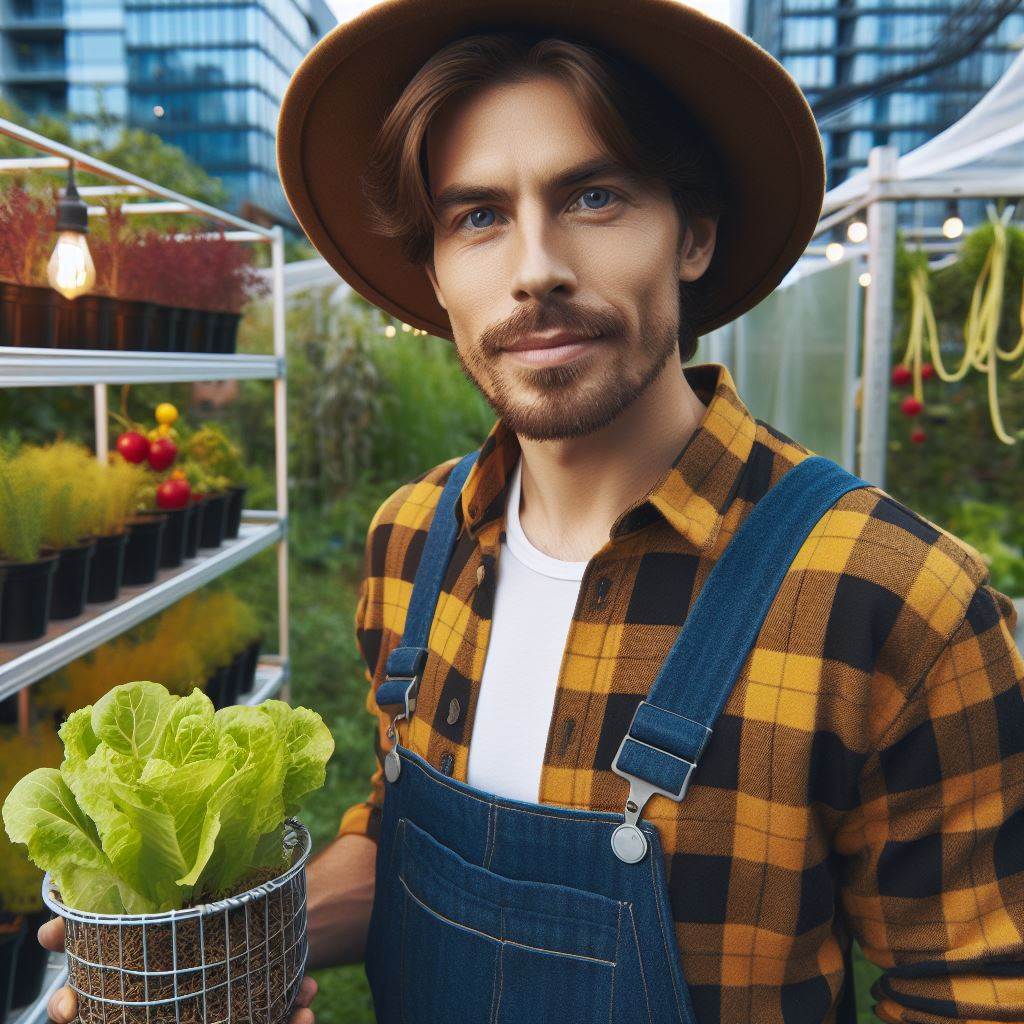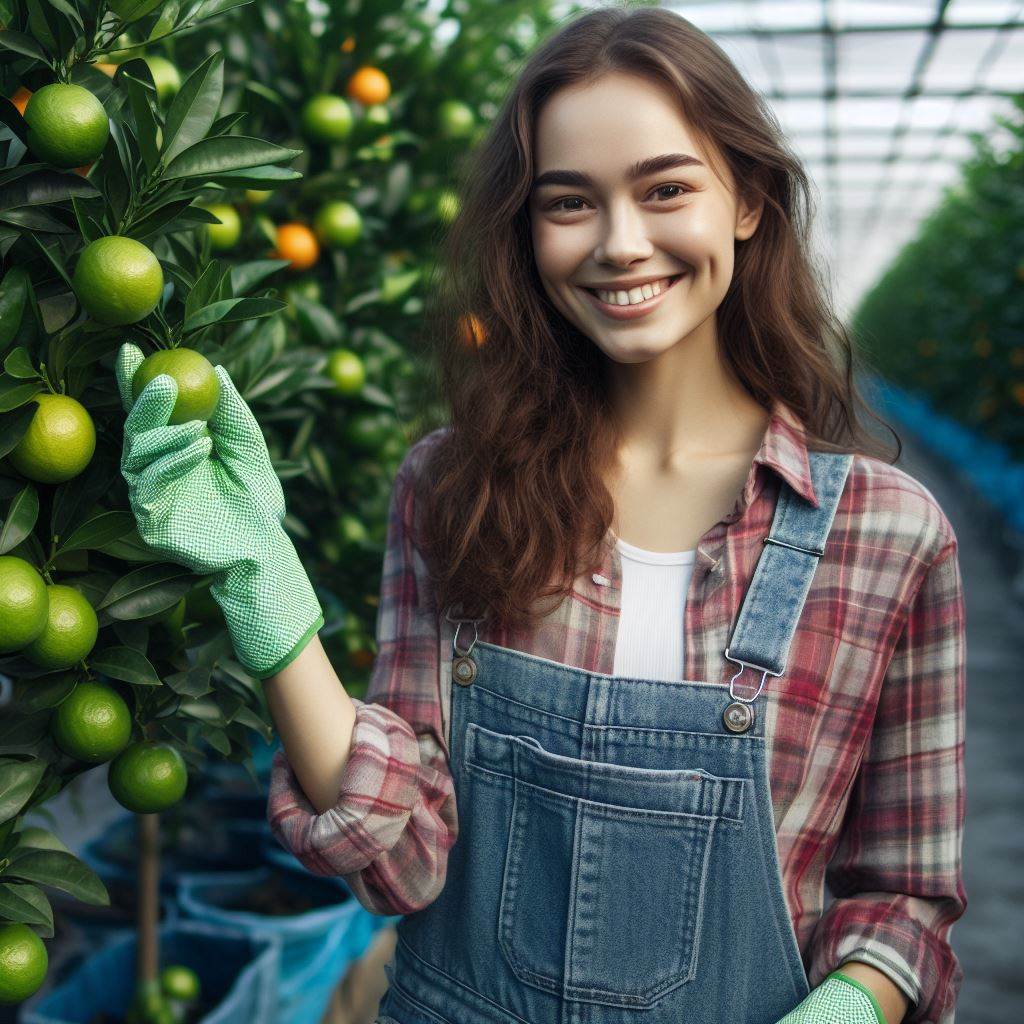Introduction
In recent years, there has been a noticeable urban farmer shift to sustainable methods among urban farmers.
Brief explanation of urban farming
Urban farming refers to the practice of cultivating, processing, and distributing food within urban areas.
It involves growing crops, raising animals, and producing food products in cities or towns.
The shift towards sustainable methods
Traditionally, urban farmers relied on conventional farming practices that often involved heavy pesticide use and high water consumption.
However, in response to environmental concerns and the need for healthier produce, there has been a significant shift towards sustainable farming methods.
Farmers are now prioritizing organic and regenerative practices, such as composting, crop rotation, and the use of natural pesticides.
These methods not only reduce harmful chemical exposure but also improve soil fertility and promote biodiversity.
Additionally, urban farmers are increasingly incorporating alternative energy sources into their operations.
Solar panels and wind turbines are being installed to power farm equipment and reduce dependence on non-renewable energy.
Furthermore, urban farmers are exploring innovative techniques like vertical farming and hydroponics.
By utilizing limited space efficiently and growing crops in nutrient-rich water solutions, they can maximize productivity while conserving resources.
This shift towards sustainable methods also involves building strong connections with the local community.
Many urban farmers have started community-supported agriculture programs, allowing residents to directly support and access fresh, locally grown produce.
Basically, the shift towards sustainable methods in urban farming is providing numerous benefits, including improved environmental impact, healthier food, and stronger community ties.
As this movement continues to grow, urban farming has the potential to transform cities into sustainable and self-sufficient food systems.
Defining sustainable farming
Sustainable farming refers to methods that promote long-term ecological balance and preserve natural resources.
It focuses on sustainable practices that minimize harm to the environment and prioritize organic production.
Sustainable farming practices
- Crop rotation involves planting different crops in succession to improve soil fertility and prevent pests.
- Companion planting promotes the growth of complementary plants, reducing the need for pesticides.
- Organic farming eliminates the use of synthetic fertilizers, pesticides, and genetically modified organisms.
- Permaculture integrates various plants and animals to create a self-sustaining ecosystem.
- Agroforestry combines trees and crops to create mutually beneficial conditions, such as shade and soil enrichment.
Importance of sustainable methods in urban farming
- Urban farming often faces challenges such as limited space, pollution, and soil contamination.
- Sustainable methods provide solutions by promoting soil and water conservation in urban areas.
- They reduce reliance on chemical inputs, making food safer for consumption.
- Sustainable practices also contribute to the overall health of the urban ecosystem and community well-being.
- By adopting sustainable methods, urban farmers can improve the resilience and productivity of their farms.
Benefits of sustainable farming in urban areas
- Enhancing biodiversity: By promoting sustainable methods, urban farmers can attract beneficial insects and birds, contributing to biodiversity.
- Improving soil quality: Sustainable practices, such as composting and vermiculture, enrich the soil, making it more fertile.
- Water conservation: Sustainable farming minimizes water usage through strategies like drip irrigation and rainwater harvesting.
- Reducing waste: Composting organic waste reduces landfill burden while creating nutrient-rich soil amendments.
- Strengthening community bonds: Urban farms can serve as educational spaces, fostering community engagement and healthy food access.
Challenges faced by urban farmers shifting to sustainable methods
- Limited space: Urban farmers often have to make the most of small plots, demanding creative farming techniques.
- High start-up costs: Integrating sustainable practices may require initial investments in infrastructure and equipment.
- Changing consumer behavior: Educating consumers about the importance of sustainably grown produce can be a challenge.
- Regulatory barriers: Some cities have restrictive zoning laws or lack policies that support urban agriculture.
- Limited resources and support: Urban farmers may struggle to access training, grants, and resources necessary for sustainable farming.
The future of urban farming lies in sustainable practices
- As urban populations grow, the demand for locally grown, healthy food will increase.
- Sustainable methods offer a viable solution to meet this demand while minimizing negative environmental impacts.
- Innovative approaches like vertical farming and aquaponics further expand the potential for sustainable urban farming.
- With increased awareness and support, urban farmers can lead the way in creating a sustainable and resilient food system.
- Embracing sustainable farming practices in urban areas can transform cities into greener, healthier, and more self-sufficient environments.
In general, sustainable farming in urban areas involves implementing environmentally friendly practices that promote biodiversity, conserve resources, and improve community well-being.
Despite challenges, urban farmers can embrace sustainable methods to build thriving, resilient farms and contribute to a healthier future for their communities.
Reasons behind the shift to sustainable methods
Urban farming has been gaining momentum as a sustainable and practical way to grow food within cities.
This shift can be attributed to several reasons:
Environmental Concerns
- Urban farmers are increasingly aware of the impact of traditional agriculture on the environment.
- Chemical pesticides, fertilizers, and intensive farming practices contribute to soil degradation and water pollution.
- By adopting sustainable methods, urban farmers aim to minimize their ecological footprint and protect the environment.
Health Benefits
- Traditional farming practices often involve the use of synthetic chemicals that can end up in our food.
- Urban farmers prioritize organic and pesticide-free cultivation methods, ensuring healthier and safer produce.
- By growing their food locally, urban farmers can offer fresh produce with higher nutritional value.
Economic Advantages
- Shifting to sustainable methods can lead to cost savings for urban farmers.
- Reducing the use of chemical inputs decreases expenses associated with purchasing pesticides and fertilizers.
- Moreover, urban farmers can generate additional income by selling their surplus produce to the local community.
Community Engagement
- Urban farming promotes community engagement and social cohesion.
- By involving local residents in the cultivation process, urban farmers create a sense of ownership and pride within the community.
- Community gardens and shared farming spaces provide opportunities for neighbors to connect and interact with each other.
In short, the shift towards sustainable methods in urban farming is driven by environmental concerns, health benefits, economic advantages, and community engagement.
By adopting these practices, urban farmers can contribute to a healthier environment, provide safer food options, save on costs, and foster a sense of community among city dwellers.
Read: Urban Farming: Challenges in the City
Examples of sustainable farming methods adopted by urban farmers
Urban farmers are shifting towards sustainable methods in order to contribute to a greener and healthier environment.
There are several examples of these sustainable farming methods that are being adopted by urban farmers.
Let’s take a closer look at some of them.
Organic farming techniques
By adopting these sustainable farming methods, urban farmers enjoy several benefits.
Firstly, organic farming techniques ensure that the produce is healthier and safer for consumption.
It also reduces the impact on the environment by minimizing chemical inputs and soil erosion.
Transform Your Agribusiness
Unlock your farm's potential with expert advice tailored to your needs. Get actionable steps that drive real results.
Get StartedPermaculture principles
Permaculture principles promote biodiversity and create resilient ecosystems that can better withstand climate change.
By incorporating diverse plantings and efficient water systems, urban farmers can conserve water resources and increase the overall productivity of their farms.
Vertical farming systems
Vertical farming systems are highly efficient in terms of space utilization.
They allow urban farmers to produce a significant amount of food in a limited area.
This can help reduce the dependence on food transportation, lowering carbon emissions associated with long-distance shipping.
Hydroponics and aquaponics
Hydroponics and aquaponics are resource-efficient farming methods.
They require less water compared to traditional soil-based farming, as water is recycled within the system.
Furthermore, the controlled environment in these systems minimizes the use of pesticides and allows for year-round production.
In addition to the environmental benefits, sustainable farming methods also have economic advantages for urban farmers.
By adopting these techniques, they can tap into the growing demand for organic and locally produced food.
This can create new market opportunities and generate additional income.
In fact, urban farmers are shifting towards sustainable methods in order to contribute to a more sustainable and eco-friendly food system.
Organic farming techniques, permaculture principles, vertical farming systems, and hydroponics/aquaponics are some examples of these sustainable methods.
By embracing these practices, urban farmers can produce healthier food, conserve resources, and create a more sustainable future for our urban environments.
Read: Market Woes: A Small Farmer’s Struggle

Benefits of Sustainable Farming for Urban Farmers
Urban farming, a practice that involves cultivating crops in cities or urban areas, has gained popularity in recent years.
As more urban farmers shift to sustainable methods, they are experiencing numerous benefits that contribute to their success and the overall well-being of the environment and community.
Increased Crop Yield
Sustainable farming techniques, such as vertical gardening and hydroponics, allow urban farmers to maximize their crop yield.
By utilizing limited space efficiently, they can grow more crops in smaller areas and increase their overall productivity.
These methods also make it possible to control environmental conditions, such as temperature and nutrient levels, which further enhance the growth and yield of the crops.
Reduced Waste and Resource Consumption
Sustainable farming practices help urban farmers reduce waste and optimize resource consumption.
By implementing techniques like composting and using recycled water, farmers can minimize the amount of waste generated and conserve valuable resources such as water and energy.
Composting organic waste not only reduces landfill contribution but also provides nutrient-rich soil amendments that enhance plant growth.
Additionally, using recycled water or rainwater harvesting systems decreases reliance on freshwater sources.
Minimized Environmental Impact
One of the crucial advantages of sustainable farming is the reduced environmental impact.
Compared to conventional farming practices, sustainable methods prioritize soil health, biodiversity conservation, and limited use of synthetic pesticides and fertilizers.
By avoiding harmful chemicals, urban farmers contribute to a healthier ecosystem with improved air and water quality.
They also minimize soil erosion, preserve valuable habitats for wildlife, and promote sustainable land use practices.
Enhanced Community Support and Market Opportunities
Sustainable urban farming creates a stronger sense of community and increases local market opportunities.
By engaging with residents and local organizations, urban farmers can build meaningful connections and gain support for their initiatives.
Many consumers are increasingly interested in purchasing locally grown, organic produce, which gives sustainable urban farmers a competitive edge.
They can sell their products directly to the community through farmers’ markets, community-supported agriculture (CSA) programs, or local restaurants and grocery stores.
This direct relationship between farmer and consumer not only provides fresher and healthier food options but also strengthens the local economy and promotes sustainable food systems.
In essence, the shift to sustainable farming methods brings numerous benefits to urban farmers.
Increased crop yield, reduced waste and resource consumption, minimized environmental impact, and enhanced community support and market opportunities all contribute to the success and sustainability of urban farming.
By adopting these practices, urban farmers play a crucial role in building more resilient and environmentally-friendly cities while improving the quality of life for both themselves and the communities they serve.
Read: From Plows to iPads: A Farmer’s Tech Leap
Learn More: Organic Dreams: One Acre, Big Impact
Delve into the Subject: AI in Agriculture: A Farmer’s Journey
Challenges faced by urban farmers during the shift to sustainable methods
Urban farming has gained popularity as a sustainable method of growing food within cities. However, this shift towards sustainable methods is not without its challenges.
Urban farmers face various obstacles during this transition, including a lack of knowledge and training, limited access to resources and technology, and space constraints in urban areas.
One of the main challenges faced by urban farmers is a lack of knowledge and training.
Many individuals who undertake urban farming have little experience or understanding of sustainable farming practices.
Without proper education and training, it becomes difficult for them to implement effective and sustainable methods.
Moreover, limited access to resources and technology poses a significant obstacle to urban farmers.
Unlike traditional rural farms, urban farming often faces restrictions on access to land, water, and other resources.
Additionally, the high cost of technology and equipment required for sustainable farming can be prohibitive for many urban farmers.
Showcase Your Farming Business
Publish your professional farming services profile on our blog for a one-time fee of $200 and reach a dedicated audience of farmers and agribusiness owners.
Publish Your ProfileFurthermore, space constraints in urban areas pose a significant challenge to urban farmers.
With limited space, it becomes challenging to grow a substantial amount of produce or accommodate livestock.
Urban farmers often have to utilize innovative techniques such as vertical gardening or aquaponics to maximize space utilization.
Despite these challenges, there are several potential solutions that can help urban farmers overcome them.
The first step is to provide adequate knowledge and training programs to urban farmers.
This can be done through workshops, courses, and mentorship programs that focus on sustainable farming practices specifically tailored for urban environments.
In terms of limited resources and technology, governments and non-profit organizations can play a crucial role by providing financial support and grants to urban farmers.
By making resources and technology more accessible, urban farmers can improve their productivity and efficiency.
To address space constraints, urban planning policies need to be revised and modified to support urban farming initiatives.
This could include allocating land specifically for urban farming, encouraging rooftop gardens, and promoting community gardens.
Additionally, vertical farming solutions and hydroponics can help maximize space utilization.
In review, urban farmers face several challenges when shifting towards sustainable methods.
The lack of knowledge and training, limited access to resources and technology, and space constraints in urban areas all pose significant obstacles.
However, with the right support and initiatives, these challenges can be overcome.
Education and training programs, financial support, and policy changes are some potential solutions that can help urban farmers thrive in their pursuit of sustainable farming in urban areas.
Read: Precision Agriculture: My Farm’s Success Story
See Related Content: Farming Futures: Young Voices in Agriculture
Delve into the Subject: Urban Farming: Thriving in Tiny Spaces
Solutions and initiatives to support urban farmers in transitioning to sustainable methods
Transitioning to sustainable methods is crucial for urban farmers to ensure the long-term viability and success of their operations.
Fortunately, there are numerous solutions and initiatives in place to support them in this endeavor:
By leveraging these solutions and initiatives, urban farmers can accelerate their transition to sustainable methods and overcome various challenges they face along the way.
Government support and policies
One of the most crucial forms of support for urban farmers comes from the government.
Enacting supportive policies and regulations is essential to create an environment conducive to sustainable urban farming.
Governments can offer financial incentives and grants to assist farmers in adopting sustainable practices.
Additionally, the establishment of urban farming task forces can address specific challenges and develop effective solutions.
Urban agriculture programs and organizations
Urban agriculture programs and organizations play a significant role in supporting urban farmers.
These programs provide technical assistance, resources, and mentorship to farmers, helping them navigate the complexities of sustainable farming.
Likewise, organizations focused on urban farming offer training, networking opportunities, and advocacy, bolstering the collective voice of farmers and promoting their interests.
Education and training opportunities
Education and training opportunities are vital to equip urban farmers with the necessary knowledge and skills to transition to sustainable practices.
Workshops and training sessions on sustainable farming practices, soil management, and pest control can empower farmers to make informed decisions.
Incorporating urban farming education into school curricula can also generate awareness and foster an interest in sustainable agriculture from an early age.
Collaboration and sharing of best practices
Collaboration and sharing of best practices are essential for urban farmers to learn from one another and optimize their operations.
Networks and platforms facilitate connections between farmers, enabling them to exchange knowledge, seek advice, and share success stories.
Conferences, seminars, and symposiums provide opportunities for farmers to hear from experienced professionals and gain insights into best practices.
Online forums and social media groups dedicated to sustainable urban farming create virtual spaces for discussions, idea-sharing, and continued learning.
In a nutshell, the support available for urban farmers transitioning to sustainable methods is diverse and far-reaching.
Governments, urban agriculture programs, education initiatives, and collaboration platforms all contribute to creating an environment where sustainable urban farming can thrive.
By harnessing these resources and working collectively, urban farmers can successfully navigate the challenges they face and build a sustainable future for urban agriculture.
Conclusion
Throughout this section, we have explored the significance of urban farmers transitioning to sustainable methods.
The benefits of adopting sustainable practices are undeniable, both for the environment and the farmers themselves.
By shifting to sustainable methods, urban farmers can reduce their reliance on chemical inputs, conserve water, and mitigate the impacts of climate change.
They can also produce healthier and more nutritious food, contributing to the well-being of their communities.
It is essential for more urban farmers to embrace sustainable practices.
With the ever-increasing urbanization, the demand for food in cities continues to grow.
By adopting sustainable methods, urban farmers can ensure a consistent and reliable food supply for their communities.
Furthermore, by adopting sustainable practices, urban farmers can inspire and encourage others to do the same.
It is through collective action that we can create a significant impact and bring about positive change in our food systems.
As we look towards the future, we can envision a world where urban agriculture thrives sustainably.
With continued efforts and advancements in sustainable farming techniques, we can create a future where urban farming plays a vital role in feeding our growing populations while protecting our planet.
It is an exciting time for urban farmers, as they have the opportunity to be at the forefront of a sustainable food revolution.
By embracing sustainable methods, they can make a difference and contribute to building a more sustainable and resilient food system for generations to come.




